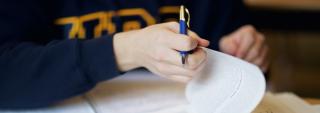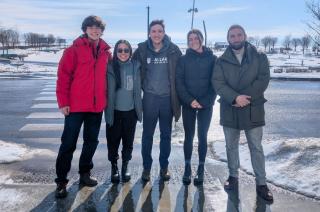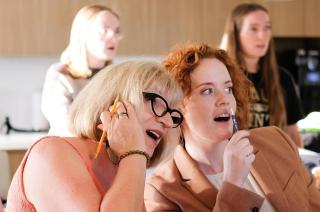COVID-19: Law School Adapts for Continued Learning and Community Service Amid Pandemic

Dario Balca
JD Student
Oct 7, 2020
This story was originally published on the Alllard Law History Project.
In the spring of 2020, students, staff and faculty at the Peter A. Allard School of Law found themselves in uncharted territory as a novel coronavirus pandemic sweeping the globe forced the cancellation of in-person classes and a switch to remote learning.
March 13, 2020 marked the last day of in-person classes, with the entire university switching to remote instruction staring March 16.
I think you don’t realize it at the time, but the physical presence of being in that building and being around your peers is such an important part of your law school experience
“I think you don’t realize it at the time, but the physical presence of being in that building and being around your peers is such an important part of your law school experience … I missed all my classmates. It was really difficult … (it felt like) being totally disconnected from reality,” student Thor Paulson told the History Project.
“We did our December exams and we kind of started figuring out what worked and what didn’t and then halfway through second term the rug got pulled out from under you and you had to figure everything out all over again.”
Law staff and faculty worked swiftly to find virtual means of delivering the remainder of their course material for the semester. Professors made use of a variety of tools including recorded video, audio recordings, lecture slides and online video conferencing services and went above and beyond to make themselves available to students during this difficult time.
“The speed that people were getting back to me at—that was surprisingly helpful,” said Meghan Zhang, who was finishing her first year at the law school at the time. “I remember some of my emails, because I wasn’t used to the online format, they would be like essays. My questions would be super long, and (professors) definitely took the time to answer each and every one of them.”
According to Zhang, the connection she had made within the Allard community up until that point also proved invaluable.
Academically, I’m very grateful for the peer tutors and the legal buddies that we were all assigned. My legal buddy checked in on me every day and made sure that I was OK
“Academically, I’m very grateful for the peer tutors and the legal buddies that we were all assigned. My legal buddy checked in on me every day and made sure that I was OK,” she said.
Despite the school’s hard work during the transition to online courses, Zhang said she remained concerned about her ability to make the most of her law school experience in the absence of opportunities to interact with peers and professors.
“I’m really concerned about essay questions. We’re not getting the benefit of the kinds of discussions we used to have in person where we’d bounce ideas off each other,” she said, adding that it would be crucial for students to make the most of the communication technologies at their disposal for as long as the pandemic prevented in-person meetings.
April exams were also held online, after which students could elect between keeping their grades, switching to a Credit/D/F grading option or withdrawing from a given course.
In September 2020, the following academic year also began with classes being held online, with a few exceptions for experiential and clinical courses having an in-person component and some limited small group hybrid teaching for first year students. By the start of that term, more than 130,000 Canadians had tested positive for the virus—including some 6,000 British Columbians—with more than 9,000 deaths reported across the country.
For those starting law school without the benefit of meeting faculty, staff and classmates in person, Zhang had a simple message: ask for help.
“As a faculty, we’re all there for each other. We received such good help from upper years that there’s no doubt that we’re going to do the same for the 1Ls,” she said.
Allard-based clinical and experiential learning programs also adapted the realities of the pandemic in order to continue providing students with invaluable learning opportunities and the communities they serve with legal services.
The Law Students’ Legal Advice Program (LSLAP), for instance, moved meetings online and on the phone in an effort to keep assisting clients with their legal matters. However, Civil Supervising Lawyer Chris Heslinga told the History Project that the pandemic has made it more difficult for both students participating in the program to access the resources they need as well as for LSLAP clients, who faced additional access to justice problems because of COVID-19.
According to Director Tamara Levy, students with the UBC Innocence Project were fortunate enough to have access files online so that they could work remotely. In a May 2020 interview with the History Project, Levy said she remained hopeful that the clinic could keep meeting in person given its small size with social distancing and cleaning protocols in place to keep everyone safe.
The Indigenous Community Legal Clinic (ICLC) also transitioned to legal services only by phone and email in order to comply with the federal and provincial governments' and public health officials' advice on social distancing.
Allard staff also worked with employers in an effort to limit the pandemic’s impact on students’ career opportunities. Members of the Career Services were available for virtual meeting with students and networking opportunities such as law firm tours and various social events were moved online.
Paulson also praised his professors, the Student Services office and Student Wellbeing Counsellor Anna Kline for their help in dealing with the psychological toll of attending law school during COVID-19.
“The counselling department came through really strong as well … I found that professors were very accessible, very sympathetic,” he said. “I felt really supported by the school through it all.”
While the pandemic hampered opportunities for students to socialize and build relationships in person, Paulson said that in the end, those who attended law school during COVID-19 might end up sharing stronger bonds that they otherwise would have.
“We’re going to have this big shared experience. We’re all going to know what it’s like to write law school exams and study for exams and take law courses from home when no one was expecting it. I think that’s a pretty big point on which you can bond,” he said. “I think people have learned a lot more empathy and openness, ironically.”
- Allard School of Law



